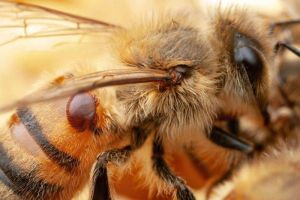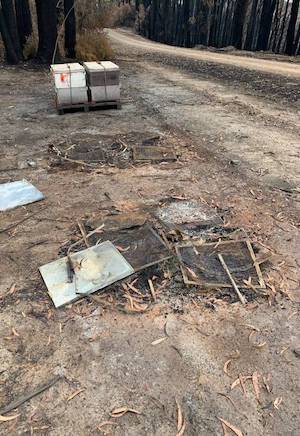Above Picture: - TAKING A HIT: Damage to NSW hives owned by Boonah-based beekeeper Robert Dewar from recent bushfires.
Beekeepers are preparing for a tough year following major losses of floral resources across the country due to drought and bushfires. Apiarists are having to artificially feed their bees with sugar and pollen to keep the population alive, with this year's focus on survival and pollination rather than honey production. According to the federal government at least 19,000 commercial bee hives have been destroyed by fire across Australia, a number expected to increase. NSW, believed to be the hardest hit, has lost about 7000 hives and 500 to 1000 beehive sites. The loss represents a 60pc reduction in NSW's production capacity.
The Australian government is providing $75,000 grants to producers, including beekeepers, in declared bushfire disaster areas but the industry is bracing for a difficult 2020, given that drought had already crippled many beekeeping operations.
Australian Honey Bee Industry Council CEO Sarah Paradice said about 1000 hives had been lost in Queensland alone due to fire, along with the almost 7000 in NSW.
"With hives that have survived, beekeepers have nowhere to put them, nothing for them to eat because of the loss of flora," she said.
Smoke from the bushfires has also affected the strength of remaining hives, with foraging field bees becoming disorientated and unable to find their way back to the hive.
Queensland Beekeepers Association secretary Jo Martin said the severity of fires couple with prolonged drought had impacted the state's vegetation and the industry's health was at a critical level. Even with recent rainfall many species of eucalpyt, a key food source, are expected not recover within 12 to 18 months.
"In Queensland we're estimating 90 to 95 per cent of our state crown land resources, food for bees effectively... is unproductive at the moment," Ms Martin said.
"The communication I'm getting from beekeepers on the ground is a lot of areas will be unproductive for at least a decade.
"The scary reality for us is there's about 45,000 hives that are needed in July to start the pollination season just for avocadoes and macadamias alone in Queensland... if we haven't got really strong hives going into the autumn months, effectively this year's fruit yield for things like avocados, macadamias and even strawberries, watermelons, blueberries... we could see some significant downturn in the yield of those crops, purely because the bees haven't been strong enough to go into pollination."
Ms Martin said for a lot of beekeepers, pollination would be their only form of income this year.
"The majority of them are telling me they haven't turned on a honey extractor in 12 months," she said.

Beekeeper Robert Dewar inspects hives.
Commercial beekeeper Robert Dewar has about 1500 hives, currently located at Townsville and Coffs Harbour, NSW.
Mr Dewar, who is also QBA's resources chairman, said last year's flooding had caused some trees in Townsville that hadn't flowered in a long time to do so.
"A lot of our normal country is around Warwick and Stanthorpe but there's been a lot of flora lost in that area," he said.
"We're talking 100-year-old yellow box trees that have just died because there's no moisture."
Mr Dewar lost hives at Boonah and at Port Macquarie and Grafton, NSW during fires and said the industry was doing it tough.
"Honey turnover is down 80 per cent," he said.
"If people support Australian honey now, they're supporting Australian beekeepers."
Jimboomba beekeeper Natasha Roebig said drought was making it hard to keep bees alive.
"We haven't done any honey extraction from the hives at all this season," she said.
A Department of Agriculture and Fisheries spokesman said while Queensland had been impacted by bushfires, it hadn't had the same degree of hive loss as in NSW and Victoria.
"There are no immediate concerns in Queensland about the effects that hive losses could have on pollination of crops," he said.
"The Queensland government is currently considering what can be done to support the industry and is liaising with industry bodies to determine appropriate action."
Queensland Country Life Victoria Nugent 30/1/2020




